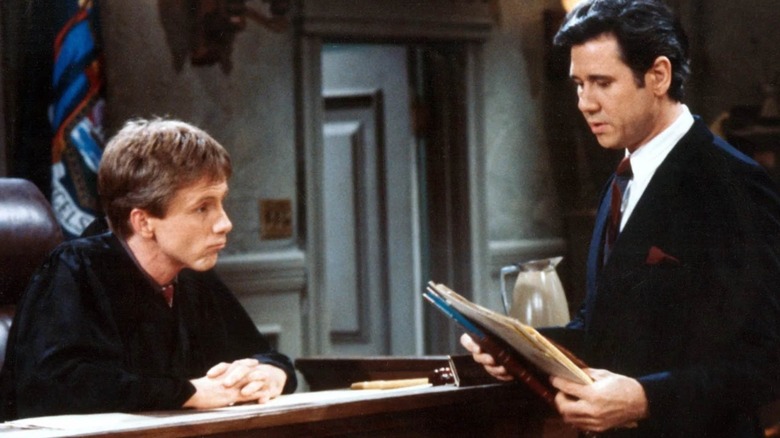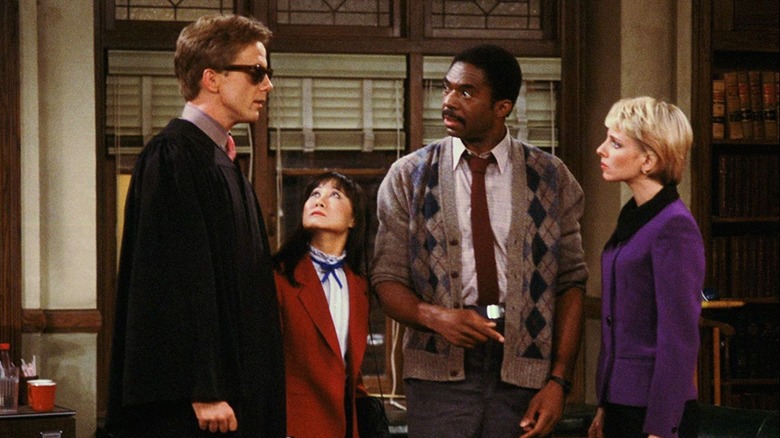Night Court's Creator Only Ever Had One Goal For The Show
Prior to creating the hit absurdist sitcom "Night Court," Reinhold Weege was a writer on "Barney Miller" and on "M*A*S*H," for which he received a grand reputation in American television. "Night Court," however, launched him into the stratosphere, as the show was part of the invaluable NBC Thursday night lineup that revolutionized television. "Night Court" came at the end of a block of programming that included "The Cosby Show" (which was responsible for saving "Night Court"), "Cheers," and "Family Ties," and the four sitcoms collectively buoyed the network to new heights. The series was nominated for 12 Emmys during its 1984 to 1992 run, with four wins going to star John Larroquette.
Despite the success of the show, Weege remained an affable, unglamorous, street-level bloke, flaunting his Chicago roots with pride. In the 2022 book "Barney Miller and the Files Of the Ol' One-Two" by Otto W. Bruno, Weege preferred presenting himself as low-fi and unassuming, loving the way he looked. The book tells a story about how Weege would go to banks only to be told by the security guards that deliveries were in the rear. Weege would then extract a check he received for creating "Night Court" and say, "Oh, I got this half-million dollar check I want to do something with. You want to help me with that?" He was a cut-up.
When Weege passed away in 2012 at the age of 62, his funeral was well-attended. Attendees were given souvenir Reinhold Weege bobbleheads. The man attended Blackhawks and Bulls games on the regular, and lived like a blue-collar Joe. He was deeply beloved.
Bruno's book quoted a 1998 interview Weege conducted with The Hollywood Reporter. In it, the writer laid out a very simple maxim for writing TV. Put simply: The audience have to give a damn.
Night Court should be 'funny and substantial at the same time'
Weege's exact quote was:
"My specialty is being funny and substantial at the same time. I want people to watch a half hour and give a damn about it afterward."
"Night Court" wasn't exactly known for its touching moments and deeply human characters; indeed, the show is celebrated for its oddness and cartoon logic. Its human elements come not from the moments of introspection and sadness, but from relatable idiosyncrasies. Judge Harry Stone (Harry Anderson), for instance, worships Mel Torme. Dan Fielding (Larroquette) possesses a sleazy lasciviousness that, every once in a while, we can all relate to. Bull (Richard Moll) is a bit of a dimwit, but we appreciate his kindness and innocence.
Weege is, of course, relating his philosophy to shows like "Barney Miller" and "M*A*S*H," two comedy shows that regularly look death in the face. "M*A*S*H" was about doctors curing the injured during the Korean War, and tragedy regularly befell its characters. Weege was one of the many masterminds who assured the careful, careful balance between comedy and tragedy on that show, making it one of the best TV shows of all time. Weege received four Emmy nominations in his life, one for "Barney Miller" and three for "Night Court."
"Night Court" was recently revived on NBC, with Larroquette returning as Dan Fielding. The new series is being sold as a continuation of the original, with Weege retaining sole created-by credit. The new series, however, was developed by Dan Rubin and star Melissa Rauch, who plays the daughter of Judge Harry Stone. Even 12 years after his death, Weege's brusque, give-a-damn form of comedy lives on.

